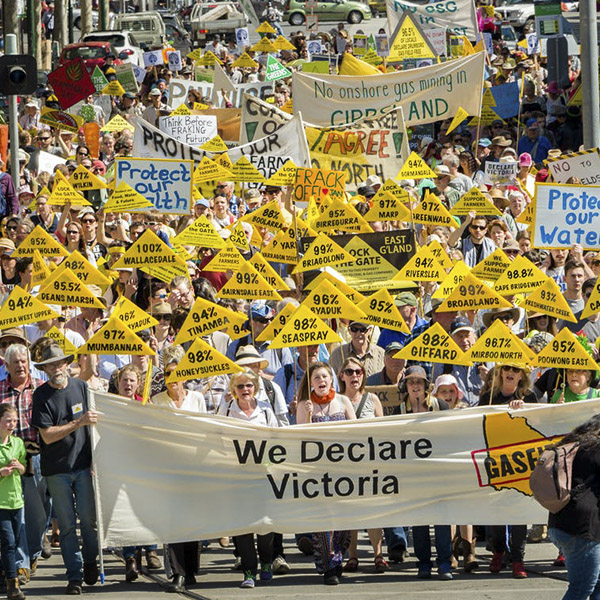The case against Australia’s gas expansion
1) The Australian government is banking on a tax payer funded ‘gas-fired recovery’
The government has put its 5 Basin gas-fired recovery plan as central to its economic vision for exports, ignoring industry forecasts and pressuring critics such as AEMO’s Audrey Zibelman who was asked to change a report’s conclusion and refused to do so.
The fossil fuel industry is heavily subsidised, receiving more – $10bn in FY20-21 – than it pays in royalties. The big players in the gas industry pay zero tax despite large profits from exporting Australian resources.
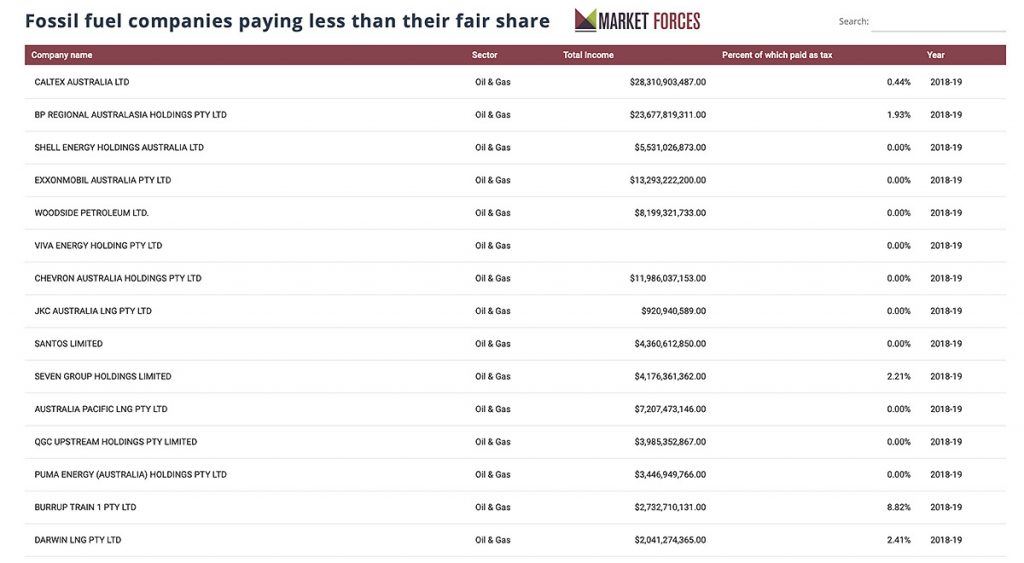
Market Forces list of oil and gas companies tax contributions for FY2019
2) Public money is set to drive gas expansion despite poor industry prospects
Demand for fossil fuels is in decline across the world and investing in new infrastructure today is likely to generate stranded assets with gas exports falling off a cliff after 2030 according to the IEA. It should not be the government’s role to prop up gas finance with tax payer funds where international uncertainty around gas has increased as the world is taking a decisive turn away from a fossil-fuelled future..
Our government wants to tip public money into massive gas expansion despite our major trading partners, the G7, and even the notoriously conservative International Energy Agency (IEA) saying that the world must rapidly transition away from coal, oil and gas to avoid catastrophic climate damage. As IEA’s Fatih Birol says “If governments are serious about the climate crisis, there can be no new investments in oil, gas and coal, from now – from this year.”
3) Fossil fuels are driving accelerating climate damage
“Australia’s dramatic expansion in liquefied gas production and export is a major factor driving current and future emissions growth” reports the Climate Council, and also states “Emissions from the extraction, processing and export of gas have been the main driver behind Australia’s official emissions staying so high…More investment in gas risks locking in huge investment losses and environmental harm.”
4) The government wants to use our money to pay fossil fuel companies to steal our kids’ future
In a widely circulated paper, Weapons of Gas Destruction, The Australia Institute reveals the massive scale of Australia’s gas expansion plans.
- “Australia’s existing pipeline of 22 gas projects, along with identified and prospective gas resources, could emit up to three times the annual world emissions”
- “Taking a global carbon budget approach to meeting the Paris Agreement goal of 1.5 degrees, Australia’s use of gas resources would use up 28% of the global carbon budget”
- “Compared to the world’s largest corporate polluters, unleashing Australia’s gas resources would emit more than double the historical emissions of Chevron, Exxon, BHP and Rio Tinto put together”

Top scientists are openly discussing the threat of societal collapse “a credible scenario this century”, a follow-on from a 2017 broadside in Nature: “should emissions continue to rise beyond 2020, or even remain level, the temperature goals set in Paris become almost unattainable.” It appears that our Government can’t face up to reality. These new massive gas plans would add significant global pressure to our already unstable climate. Let’s heed the dire warning in Steffen et al: “We cannot exclude the risk that a cascade of feedbacks could push the Earth System irreversibly into a ‘Hothouse Earth’ pathway.”
Australia is blessed with some of the world’s best renewable resources, a skilled workforce, and most of the mineral precursors needed for renewables manufacturing.
It’s time to step up and work for a sustainable future, where we export electrons directly, or as liquified hydrogen or embedded in finished goods, instead of death-dealing coal and gas.
Join us, and support campaigns against gas expansion

Wetsuits for Westernport No AGL Gas Terminal action
Success! AGL’s Crib Point gas terminal was defeated
The AGL proposal to build a gas import terminal in the heart of a pristine Westernport precinct was rejected by the Victorian government in March 2021 after a longstanding campaign by many local, community and environment groups.

Wetsuits for Westernport action shows fierce community opposition to AGL’s Crib Point – organised by Save Westernport and Environment Victoria
The Victorian government media announcement described their reason as wishing to protect the marine environment and said AGL’s proposal would cause ”unacceptable impacts” due to its location in an an internationally recognised wetland and 12 kilometres from a marine park. The proposal was rejected after a sustained campaign, wide support across the community, a 10 week hearing and a record 6,000 submissions received, with an overwhelming majority opposed to the terminal.
“This has been an exhaustive, open and transparent process and this is the right outcome for the local community, the environment and Victoria as a whole,” Mr Wynne said. “It’s very clear to me that this project would cause unacceptable impacts on the Western Port environment and the Ramsar wetlands – it’s important that these areas are protected.”
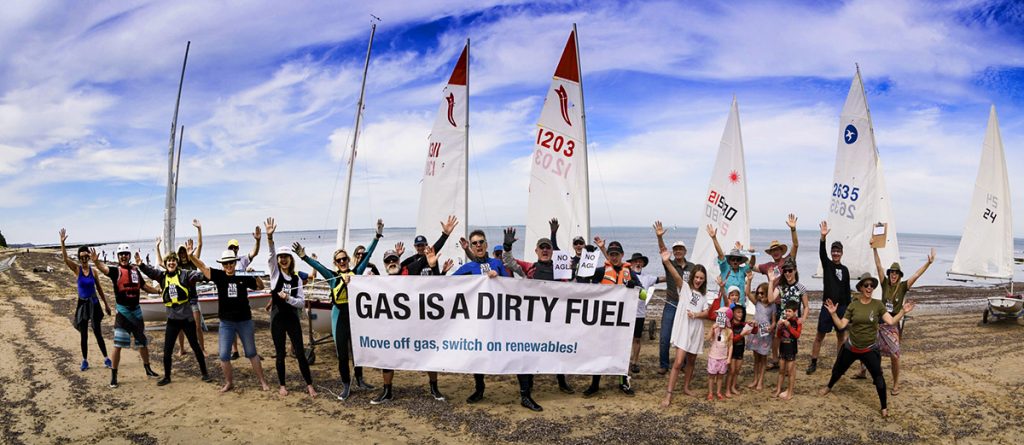
Wetsuits for Westernport action organised by Save Westernport, Environment Victoria and other NGOs and groups
Lighter Footprints’ members supported other groups including Save Westernport and Environment Victoria, were involved in actions, and we wrote letters and submissions.
This campaign really showed what people power can do in a more public way. Sometimes it is the quiet conversations that are called for. Meetings with MP’s and government departments. Rational and reasoned logic. But sometimes an issue touches peoples emotions in a very primal way. People’s power can then become truly galvanized and the community collectively shows our politicians what we care about and how many people will mobilize. In the end we had all sides of politics – Federal and State on our side at Westernport. It was a truly amazing community effort. Save Westernport and EV campaigned for years. And Lighter Footprints helped ‘bring it to the city’.
We campaigned strongly against these localized environmental impacts, but just as importantly, we also raised two more general points that apply to any proposed gas development in Victoria:
1.” Natural gas prices will never return to the ‘good old days’ when gas from Bass Strait was cheap and plentiful. Gas Price will remain at $8-10 / GJ regardless, and to continue investment in gas locks Victorian households into higher energy costs.
2. Secondly, for climate reasons, we need to move away from gas. Gas is no longer seen as a ‘clean’ fuel. Emissions targets will increasingly push us away from burning gas towards renewables-electricity powered solutions. The Paris Agreement, the Victorian Climate Act 2017, and a wave of international jurisdictions, like the EU, will increasingly impose tariffs or place restrictions on emissions from burning gas.
The appliances are readily available – for electrification of home space heating, as well as heat pump hot water for households – we must be moving this way now – not sometime in the future.
Getting more gas by fracking agricultural land, tapping coal seams, or importing from overseas makes absolutely no sense in 2021.

Media release from Minister Richard Wynne on Crib Point gas terminal
And so on the 30th March 2021 the decision was given.
“Gas Proposal ruled out due to environmental impacts“.
Wow! Disbelief. Relief. Celebrations. We did it !
A celebration was held at Balnarring on Saturday afternoon. Superb weather, superb day. Huge thanks to everyone involved.

Community action against Crib Point terminal at Woolleys Beach with Save Westernport
Corio campaign
Geelong residents are opposed to a gas terminal proposed by Viva for Corio Bay.
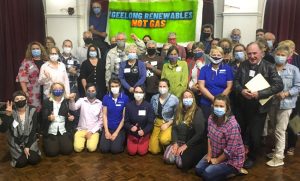
Geelong Sustainability meeting about Corio gas import proposal
Sally Fisher from Geelong Sustainability said:
“Viva’s proposal takes our community in the wrong direction. Fossil fuels like gas and coal are on the way out.
“Viva says it supports the transition to cleaner sources of power but, so far, the only detailed proposal is to import gas, a dirty, polluting fuel that can be as damaging to our climate as coal.
“Geelong can be a renewable energy hub. We have the infrastructure, skilled workforce, and proud manufacturing heritage to position our city as the place for a rapidly growing clean energy industry, especially given our proximity to the big battery planned for Moorabool.”
Betaloo Basin campaign
Currently the Australian government sees the Betaloo Basin as integral to its ambitious 5 Basin gas-fired recovery plans. However the scale of climate risk is very high.
- Betaloo would be a massive carbon project – “with enough energy to power Australia for 200 years”, threatening our Paris targets according to the ABC.
- Emissions from just one field – 117 million tonnes of greenhouse gas – would be equivalent to 22 per cent of Australia’s current annual emissions.
- The government has has acknowledged the scale carbon risk – in 2019, the former Commonwealth Environment and Energy Department warned Minister Taylor that emissions “might be difficult to offset … Developments could eventually lead to life cycle emissions in Australia of 5 to 39 million tonnes of carbon dioxide equivalent per year.”

Opposition to Betaloo fracking – image Protect Country Alliance
Traditional owners oppose NT fracking, fearing ecological impacts, saying they had not been properly consulted. Communities lead the Protect Country Alliance, mobilising environmental organisations, youth organisations and the grassroots. Opposition centres around sacred water, impacts on aquifers, health and socio/cultural risks, and indigenous climate justice.
Public funds are being used to accelerate gas and oil exploration with $220 million in new funding earmarked to support the Beetaloo development. This includes the $50 million Beetaloo Cooperative Drilling Program and the government committing $174 million for the Northern Territory Gas Industry Roads Upgrades. Recently indigenous groups were promised a Senate Inquiry, with public ‘consultation’ (with a two week deadline) through the recent Senate Submissions. You can read Lighter Footprints’ submission here. Despite this consultation process Minister Pitt has just announced $21 million to a company with strong links to the Liberal Party “to frack the Betaloo Basin”, and Origin resumed drilling finding “valuable liquids-rich gas” (yes, appears Betaloo is still all about oil).
There are at least 10 fossil fuel companies involved in expanding the Beetaloo, including Origin.
Why is Australia still pursuing fossil fuels the world looks to decarbonise?
Demand is in decline across the world and investing in new infrastructure today is likely to result in stranded assets, particularly given that renewable energy and storage solutions are expanding rapidly. Fossil fuel companies are looking for taxpayers to provide substantial cover for these risks.
Narrabri gas project and Kurri Kurri gas plant
Santos’ Narrabri Gas Project would involve driving 850 wells 1km deep. Despite a massive 23,000 submissions of which 98% opposed the project, the Independent Planning Commission (IPC) said it could not consider broader policy issues and approved the project in September 2020. The project is vehemently opposed by Gomeroi custodians, the local community, farmers and shareholder activists. IEEFA’s submission to the IPC highlights that the project will deliver expensive gas, will not lower prices, and will deliver into a global gas glut.
Santos also has grossly underestimated the amount of flaring and leakage, using an Emissions Factor of only 0.0058%, when Australia cites 0.5% to the UN, the US EPA uses 1.4% and a recent study in Nature suggests 2.3%, which would make Narrabri gas dirtier than coal, also due to its very high percentage of waste CO2 in the wells. The AFR has reported that retired Fire Chief Greg Mullins, says that the project would become a massive fire risk, and hydrologists warn of serious and irreversible damage to aquifers and agricultural water supply.
The Environment Defenders Office has launched a legal challenge, taking Santos to the NSW Land and Environment Court. In the mean time the Government is pressing ahead with an off taker, a controversial gas plant at Kurri Kurri, despite large quantities of renewables and storage entering the power grid and probable losses. Santos say that a final investment decision is due in 2023.
Learn more about the battle to save the Pillaga here, support CSG Free North West here, and learn more about the Kurri Kurri gas plant at the Gas Free Hunter Alliance here and sign the petition here.
Scarborough LNG project
Woodside and BHP’s Scarborough to Pluto $16bn LNG project is “the most polluting fossil fuel project currently proposed in Australia”, worth more than 15 coal power stations, according to a recent joint report from The Australia Institute and Conservation Council of Western Australia (CCWA).
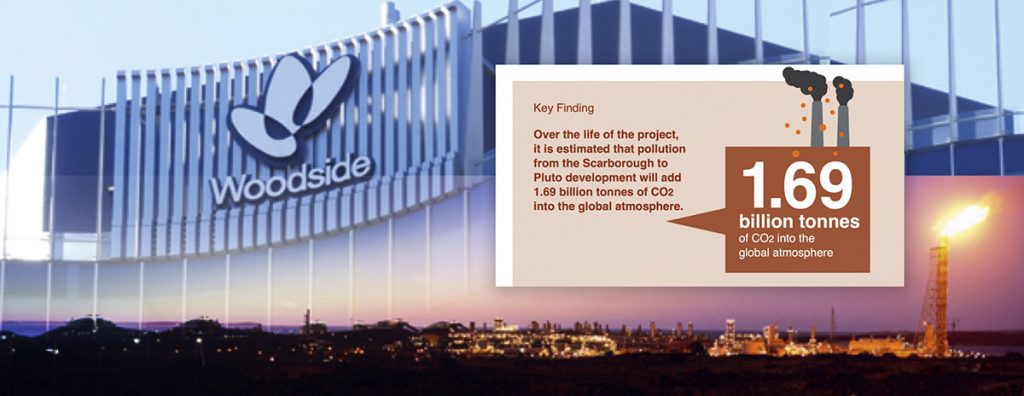
A large new gas field 435km off the Pilbara coast would be developed, the gas piped onshore to be processed on the Burrup Peninsula then processed for exported at an expanded Pluto LNG facility. It would result “in annual carbon pollution equal to over 15 new coal fired power stations, and more pollution than the proposed Adani coal mine”. The direct carbon pollution from this project (over a lifetime, a truly massive 1.6 billion tons) “would increase WA’s total emissions by almost 5% or 4.4 million tonnes per year.”
Boiling Cold states that “Woodside has no Plan B” if Scarborough falls over, and that the project is “no sure thing”. “‘Both NWS and Pluto will go into decline this decade,’ Coleman said.” Boiling Cold states “it is Scarborough or bust for Woodside… Long-term, large-scale gas production with offsets is unlikely to compete along the value chain with renewable energy when Scope 3 emissions from Woodside’s customers are included. The amount of carbon capture and storage and vegetation offsets required is unmanageable.”
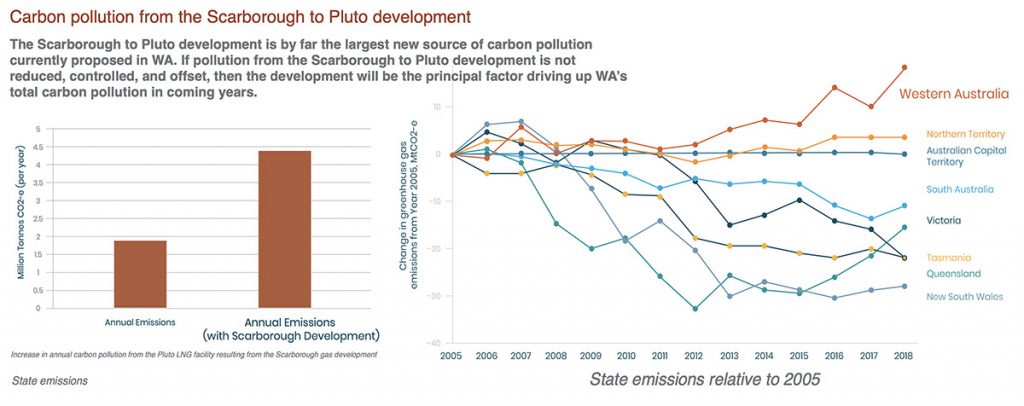
Carbon pollution in WA is increasing with LNG exports
The project has been approved “without assessment of these impacts, or the damage the project would cause to World Heritage Aboriginal rock art.”
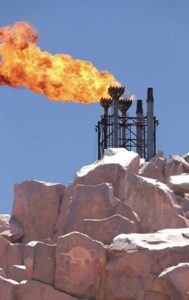
Murujuga rock art with LNG facility in the background
CCWA have been leading the fight with petitions, legal challenges and investor notices, against this heritage-destroying project, which would make it impossible for Western Australia to reduce emissions in line with the Paris Agreement. The recent approvals, even with some new conditions, would still result in “carbon pollution from the project equal to 14 coal-fired power stations every year and did not address concerns regarding the project’s impacts on Aboriginal heritage” according to CCWA Director Piers Verstegen.
Want to help? Visit CCWA’s Scarborough campaign page, join their letter campaign, and join Market Forces’ Woodside shareholder campaign.
Where should Australia be headed?
We have the technology to move away from coal – it’s renewables and storage with improved grids
We have the technology to move away from gas – it’s electrification (heat pumps) and development of green hydrogen
We have the technology to move away from oil – it’s a move to electric vehicles and green hydrogen for heavy transport
Renewables will increase our energy self sufficiency and help us avoid carbon tariffs as the world pivots away from fossil fuels
Australia can be a renewable energy superpower – exporting electrons, green hydrogen and clean manufactured goods
Next Steps
We encourage you to register your interest on our Community Action page for Lighter Footprints street stalls against gas!
1) Become more informed about gas
Learn more about gas campaign successes, how the gas industry rips off ordinary taxpayers and the threat gas poses to our climate.
- Guest blog from FOE’s Campaign Coordinator Cam Walker on gas campaigns in Victoria
- Gas harms our health: Climate Council’s Kicking the Gas Habit
- TAI’s Wrong Way, Go Back on why the gas-fired recovery will fail to reduce prices or increase jobs
- Why is Gas Bad for Climate Change and Energy Prices from the Climate Council
- TAI’s Weapons of Gas Destruction for a sense of scale
- Check out Protect Country Alliance for information, from simple explainers to deeper dives, including this gem from Robert Howarth, scientific godfather of NY State’s retreat from fracking.
- Check our Gas-fired Recovery Facts in a nutshell blog, and our Gas Speedo fact sheet
2) Check out our Fully Electric Home, and the fight against gas event YouTube recording
Learn more about clean, safe and affordable homes and how we can push back about publicly funded gas destruction from our two speakers:
- Cam Walker, FOE legend and one of the main movers of Victoria’s legislated ban against fracking and unconventional gas
- Tim Forcey, energy advisor and coauthor of Melbourne Energy Institute research on gas spoke on how to start the shift to cleaner, safer and affordable electric homes.
You can watch the YouTube video here, download the agenda with links here.
3) Do you have a couple of hours on some Saturday mornings?
We encourage you to register your interest on our Community Action page for our Boroondara Saturday morning stalls, where we are building up our Koyoong campaign volunteer base, and handing out high quality resources to enable people to move their homes away from gas. Not only does that help people protect their families health and save on energy bills, but it also puts pressure on the gas companies as they lose their social licence. AGL announced its de-merger after its loss at Crib Point.
4) Do you have shares, super, or would like to learn more about shareholder and corporate activism?
Market Forces has been a major player in the global shift of capital away from fossil fuels with a multitude of successful campaigns including insurance, super and shareholder action. Check out information on fossil fuels subsidies and Santos, Woodside, Exxon, Shell and more. As Sarah Barker, who was the major contributor to Mark Carney’s Tragedy of the Horizon speech and the Hutley Opinion said to us in one of Lighter Footprints large town hall forums: “ten letters [to your fund] is a flood” – it’s time to make our money work for good!

Woolley’s Beach action against AGL Crib Point terminal
5) Connect with current gas campaigns
Corio gas terminal
- Support Geelong Sustainability‘s Corio no gas terminal campaign here
Friends of the Earth
- Join Friends of the Earth for the online launch of ‘Drillwatch’, a new digital resource to empower the community to oppose new gas drilling in Victoria on August 11.
- Say no to new oil and gas drilling in Bass Strait.
Betaloo Basin and NT gas
- Support NT indigenous Protect Country Alliance here, and read their explainer here.
- Support successful indigenous frontline activists Seed Mob, sign up against shale gas and fracking here.
Scarborough and WA gas
- Read CCWA’s Scarborough campaign page.
- Join Market Forces’ Woodside shareholder campaign.

Supporting No AGL gas terminal action at Woolleys Point

